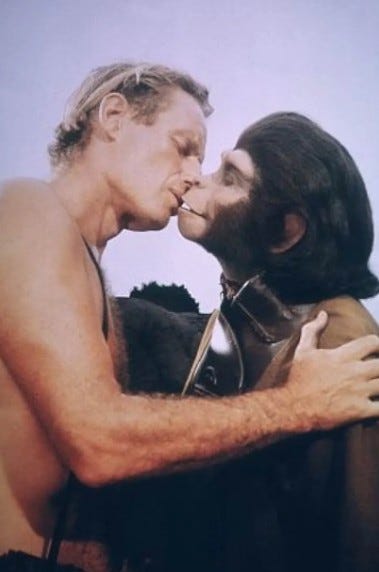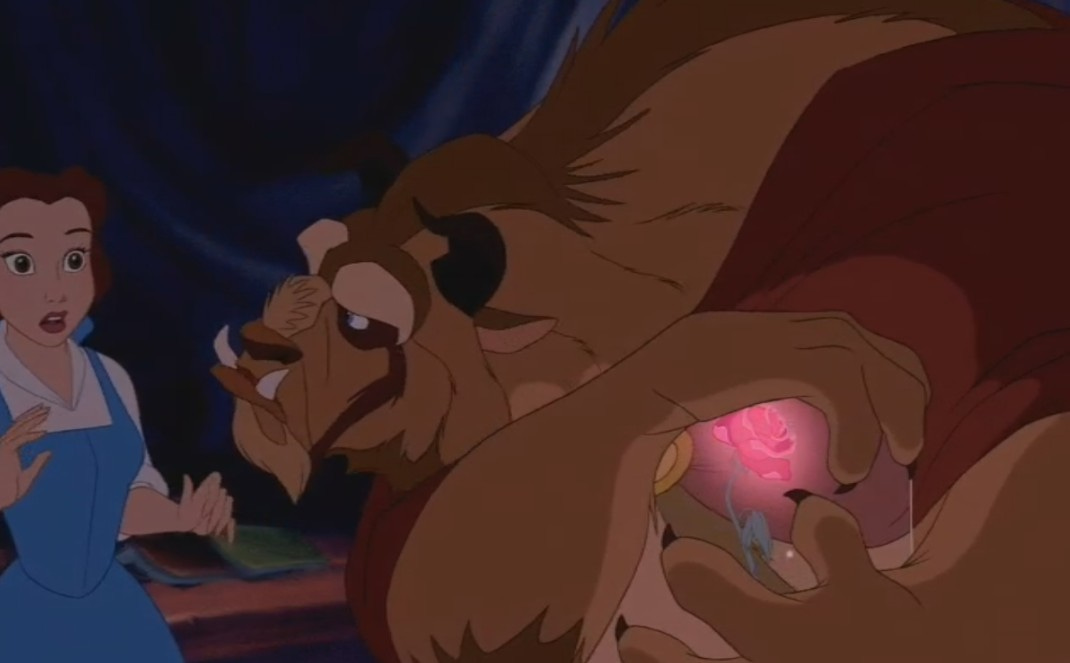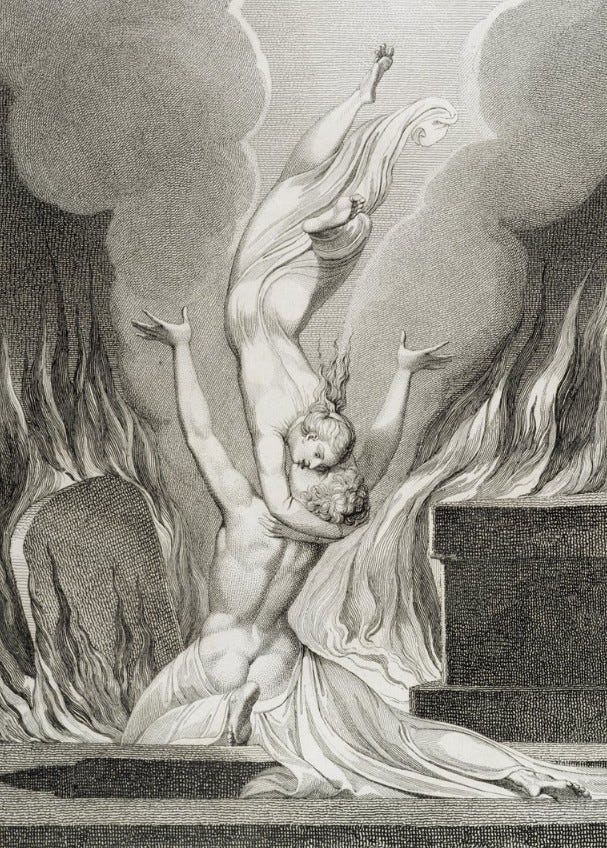Evolutionary psychology functions as a key mental model of modernity. From political issues to educational questions, the problems concerning human nature are explained through a combination of behaviorism and evolutionism. First the agency of a person is removed by saying all that they do is unconscious and involuntary – stimulus based and driven by external incentives. Then it’s argued that these triggers got forged in biologically, by unguided natural processes.
This way of thinking instills a dark view of human nature. The way it frames love and romance is particularly grim: men must be distant and dominant, and they must never show any vulnerability to a woman. If she catches a scent of weakness, she will balk and run, and find an “alpha” with the power to dominate both her and all the beta males under him. Women in turn must game with their sexual leverage, either flaunt and play coy, test and probe without revealing their cards, sow confusion and uncertainty, and ultimately try to attract the wealthiest, most powerful, highest status male available.
This, or a version of this, is how young men in particular are often encouraged to see the world, see love, see women. Of course the general attitude of cynicism towards life and love is as old as time, but evolutionism offers it a new veneer of scientific authority.
The trick is that evolutionism doesn’t market itself as cynical, nor does it even seem at first appearances to have anything to do with love – it is supposed to be an objective and verifiable explanation concerning the origin of mankind. But when a young man studies evolutionism he imbibes cynicism between the lines, perhaps without ever really noticing.
When first taught, the model is accepted generally and in the abstract, but in time it ends up applied specifically and in practice, with disastrous consequences to how we treat each other. Indeed, the evolutionary worldview constitutes a threat that extends to the most intimate depths of the human heart.
Dance of the apes
The evolutionary model argues that love and attraction are the products of biological drives and instincts. Men must be strong, dominant “alphas” to win mates, and women can’t help but seek for wealth and status. If as a man you aren’t an alpha, you must at least pretend to be such so as to satisfy the primal instincts of a woman. The view has a superficial plausibility: it neatly explains much of human behavior: the harsh competitiveness of men, the fickleness and pragmatic cynicism of women.
It also contains a perennial truth: biologically speaking we are mammalian, with bestial drives that are always fighting with the better angels of our nature. It is easy to perceive that if a man engages in courtship with a bestial woman, it will be needful to treat her as a beast driven by her instincts. You’ll be more an animal tamer than a lover.
The point to be made is that evolutionism only endeavors to explain the mammalian side of Man, and indeed posits that’s the only side. The stakes that result are very high, and if most people stopped to think of the full implications of the evolutionary model, they would surely reject it as obviously untenable, even unlivable.
For in order to accept the evolutionary account of the relations between men and women, you must come to believe that love is a chemical reaction in the brain driven by survival instincts, instead of constituting a shared, supernatural gift. You must believe that sincerity, openness and authenticity in a man are weaknesses instead of strengths, and shall undermine attraction and marriage instead of being their foundation. You must believe that marriage is a pragmatic institution, ultimately driven by the selfish motives, instead of a spiritual commitment spurred by the yearning to be united with the one you love.
After the bomb of evolutionary psychology has exploded, we find ourselves in a wasteland where relationships appear as a game of conquest or a dance of apes. Men perform, dominate, beat their chests, collect shiny things, and thus win a woman’s affection. At first glance it seems the role of women is to select the most dominant and prestigious man they can attract. But really it would be false even to talk about selection, as all is driven by instinct. Rather, women’s feelings get triggered by stimuli and they can’t help but respond accordingly.
Now, the problem is that all this sounds awful to the ears of sane people. But how could it sound so awful if it’s true? If it’s true, we ought to be mere mammals incapable of value judgments, unable to oppose our baser natures. As it is, the reality of the distaste we feel shows that the model is fundamentally untrue and inhumane, and accepting it would be to accept the most abject slavery.
However, such slavery it does have its temptations. For one thing, it justifies cowardice. The bravest thing a man can do is leave his heart open for disaster. Cynicism offers him a solid justification for not taking the risk: “you cannot succeed through openness or authenticity, only destroy yourself.” By adopting this view the man turns courage into recklessness or stupidity, giving himself an easy way out.
If he nevertheless decides to pursue women and marriage, he gets to do it from a safe distance, without putting his whole self on the line. Marriage can then be treated as a strategic alliance for securing resources or pleasure or status or progeny. This attitude protects the man from a broken heart by disallowing the act of self-giving.
What becomes key is “maintaining frame”. A man you must always retain control and avoid any signs of vulnerability to preserve stability in the relationship. Emotional distance becomes a virtue, authenticity a weakness. It should be noted right away that in reality authenticity does not mean emotional incontinence. A man can be authentic and reveal his true self while retaining self-control and remaining the reliable rock for his wife. A man can say “I am sad” and explain why, without sinking into hysterics. Neither does sincerity signify being a pushover – a man may be sincerely principled.
At its best, what the evolutionary view of marriage can offer you is functional co-operation with “a partner” (as wives and husbands are nowadays often called) or a kind of “colleague” in a “joint enterprise”. But there is no depth, no joy, no connection, and no mutual devotion. You have not become one flesh. One must ask what will such a couple even have to say to each another? If their souls cannot be in touch, what is the point of their supposed marriage?
This is what is often meant when people say they feel suffocated and isolated in their own marriages. The man has focused on hiding his emotions and vulnerabilities, and adopted a rigid frame of stoic dominance – either to deal with a woman whose character is bestial and requires this animal tamer routine, or because he dare not even find out what his wife’s heart is really like. One possibility is that at some point the charade comes crashing down in a moment of personal crisis. The other is that the plan succeeds and the man grows into the rigid role he set up for himself.
The following advice is often given: “Fake it till you make it.” If you realize you are not alpha, act as if you were, and then a woman will fall for you and rely on you. The advice often comes with the idea that later on, after you’ve really grown into an alpha and need not fake it anymore, you can stop the act and reveal your true self. But of course relationships aren’t like that and people aren’t like that.
A marriage is built gradually, and will assume a particular character based on habits established early on. It tends to be very difficult to later change the fundamentals. If there is no openness in the beginning, there rarely is at the end. Similarly with the man himself: if he successfully adopts a hard, narrow, distant frame at the start, that’s the shape he’ll grow into, and the shell he’ll have built will confine him as much as it protects him. To hide and to suppress is no way to become greathearted. A heart must be worn on the sleeve for it to grow to its full size.
True growth of heart happens not within a frame, but without frame, with nothing held back in fear – exposed to all the dangers posed by sin and man’s baser nature. As a husband you must face these risks together with your wife, and grow jointly. As long as you remain behind a frame, no matter how authentic and open you wife tries to be towards you, she can only engage with your role, not you as you really are. Thus you end preventing her growth as well as your own. As long as the man hides himself it will be impossible for the couple to grow together, in fact impossible to even really be married in the true sense of the word.
This turns even a victory into a kind of defeat. You shall never know your true self if you cannot be honest. What you were created to be shall remain a mystery. Instead you’ll end up with a hard shell and a small heart. A shadow of yourself.
Cracking the lock-box
In The Four Loves (1960), C.S. Lewis points out that despite what we may think or wish, there is ultimately no way to protect our hearts. Either we expose them to breaking by being open in love, or we close them in the lock-box of frame games and avoidance. It is true that inside the lock-box the heart will remain well guarded from the risk of breaking. But in fact you’ve changed a risk into a guarantee: inside the box your heart may not break, but it will shrink, freeze, and harden.
Shocked by this prediction, if we now decide to take our heart out of the box while it’s still warm and soft and sizable, how should we go about life? What is the practical alternative to the evolutionary model of love?
First, we are to accept the risk. To accept that love is an adventure, and an adventure is not worth the name without grave danger. Secondly, we must endeavor to adopt the attitude of smiling sacrifice – the more you give and expose, the more you keep and gain. By refusing to reveal your vulnerabilities, you guarantee a slow death by attrition, locked inside a box. Though openness comes with risk of exploitation and disappointment, it is also the only thing that makes intimacy possible, and as such it’s not a threat but the key to trust and true unity.
Thirdly, we stop regarding ourselves and our beloved as animals, and realize that we are miraculous creatures reflecting the image of God. Trust that a woman can love you, not just be influenced by you. Trust that she really has an immortal soul capable of incredible things that only souls can do. Trust that she is not just a biological machine triggered by inputs and driven by instincts. Trust that you are not in love with an animal.
The point of all this is not to tell men that women can’t be fickle, manipulative, cynical, pragmatic, driven by base impulses, or mercenary in their search for resource-rich, dominant males. Nor is it to say that power games don’t take the place of love as the foundation of many relationships. We can admit that all this is part of human fallenness. Indeed, crucial in choosing a spouse is to look for qualities that reveal something higher than animality: a striving upwards, an internal commitment to objective morality, a gaze directed towards God.
To understand the situation we face, let’s ask ourselves where would we end up were we to say no to trust and love, and believe that there is no way out, no alternative? What would we do with ourselves if we really believed that the noble, supernatural understanding of life is only fit for children, hopelessly naive and dangerously idealistic?
If love is really just a biological power-game underneath, and if man is really just an animal, why even bother? What woman would want a mammal as her husband? What man would want an ape as his bride? We see how evolutionary cynicism renders everything absurd. For life to make any sense at all, we can’t help but abandon evolutionism.
As we approach the end, let us imagine an evolutionary psychologist who somehow got the opportunity to explain his theory to an ancient caveman. Suppose the scientist was able to stop the bearded hunter amid his business, and carefully explain to him how love, properly understood, is a dance of two beasts, driven by impulse and incentive. We can be confident the gruff man would first laugh at the foolishness of his visitor, and then pity the smallness of his heart. He would shake his head and begin to speak.
“Love,” he would reply, a smile spreading on his face, “is a joint pilgrimage of two souls in mutual surrender.”
Join us in the endeavor to regain the Discarded Vision!







